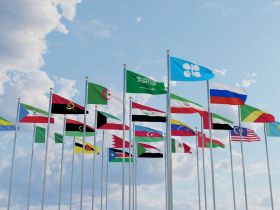Saudi to abandon price target in bid to regain market share: FT
Quantum Commodity Intelligence – Saudi Arabia is set to start increasing oil output from December after sidelining its nominal price target, according to a report in Thursday's Financial Times.
The report claimed that Saudi Arabia is ready to abandon its 'unofficial' price target of $100/b as it prepares to increase output in a bid to lift its market share.
It added that the move signals the Kingdom is resigned to a period of lower oil prices, citing people familiar with the country's thinking.
The report sent benchmark crude prices Brent and WTI tumbling more than 3% in early trading Thursday before recovering slightly.
According to the IMF, Saudi Arabia needs an oil price of close to $100/b to meet spending plans, noted the FT report.
The OPEC+ alliance has kept a tight lid on production since the Covid-19 pandemic at the turn of the decade, but there has been growing unease within the group that relatively firm prices have allowed production to grow elsewhere and take market share.
The primary threat has come from the US, where drillers have continued to increase output and exports, while other producers in the Americas have plans to expand production rapidly, notably Brazil and Guyana.
Eight OPEC+ members were scheduled to lift production by 180,000 bpd in October as part of plans to restore around 2.2 million bpd of voluntary cuts over a 12-month period but have delayed plans for an initial two months.
Speculation had been growing for a further deferment but the FT said officials in the Kingdom are committed to bringing back that production from 1 December, even if it leads to a prolonged period of lower prices.
Target
However, some analysts have pointed out that Saudi does not have a formal $100/b target, so any output increase is not necessarily linked to a price goal.
"When did Saudi announce an official price target for crude? They needed higher prices for a balanced budget, sure, but a $100 target?" commented StoneX market analyst David Scutt on X.
Senior Research Analyst at Energy Intelligence Amena Bakr also questioned the alleged price target, commenting that "$100 doesn't even make sense because it would harm demand."
The briefings to the FT could also be a warning shot aimed at those within the OPEC coalition that have been persistently overproducing – most notably Iraq and Kazakhstan, along with Russia to a lesser extent.
Battle
OPEC+ last engaged in an internal battle over market share and pricing in early 2020 when the pandemic first took hold, but the group quickly agreed to record supply cuts of 9.7 million bpd which have so far only been partially restored.
OPEC also squared up to US producers in the mid-2010s in a battle for market share and an attempt to price out frackers, sending prices tumbling to below $40/b.
But the FT report said that Saudi Arabia is no longer willing to continue ceding market share to other producers, believing it has enough alternative funding options to cover a period of lower prices, such as tapping foreign exchange reserves or issuing sovereign debt.
Analysts estimate that OPEC+ currently sits on around 6 million bpd of spare capacity, most of which is held by Saudi Arabia and the UAE. The UAE has also been keen to increase its production following major investments to lift capacity.
Saudi Arabia has been producing just under 9 million bpd this year, well below its 12 million bpd maximum, although it has abandoned previous plans to lift capacity to 13 million bpd.
The Quantum average price for Dubai crude – the primary pricing reference for Saudi and other Gulf producers - was $77.61/b on October-loading barrels versus $83.84/b on September-loading crude, a drop of 7.5% for the lowest average of 2024 and a third consecutive monthly loss.
The group's Joint Ministerial Monitoring Committee (JMMC) will next meet on 2 October, while a full OPEC+ meeting is scheduled for 1 December, where ministers are set to discuss 2025 policy.



